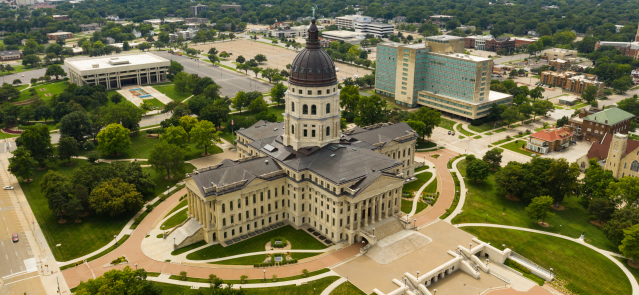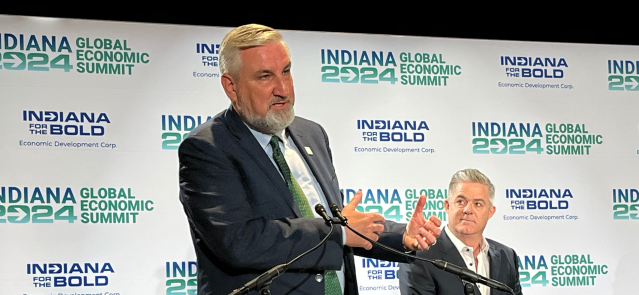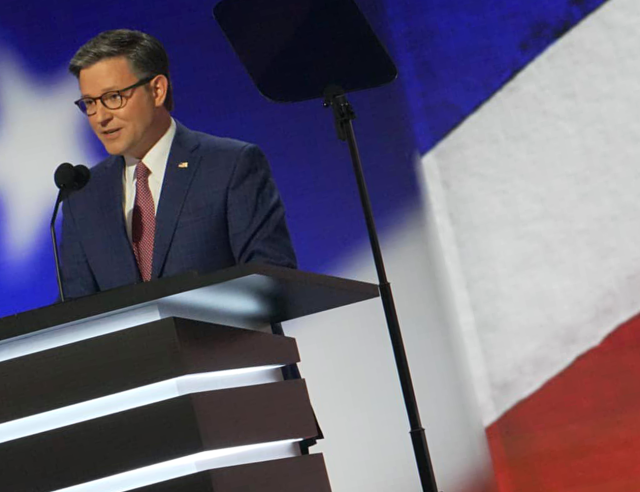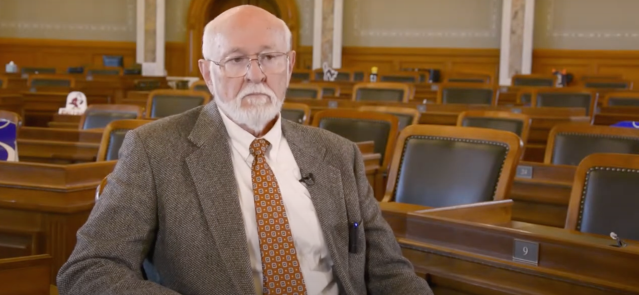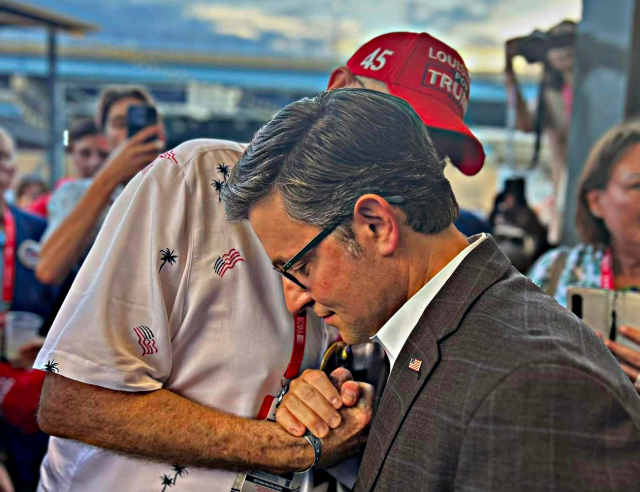Editor’s note: LaPolitics/State Affairs Managing Editor Jeremy Alford was one of a number of our journalists who covered the Republican National Convention this week for State Affairs. Below is a glimpse into the consistently hectic, rarely unscheduled and quietly ambitious political life of Mike Johnson, speaker of the U.S. House of Representatives.
MILWAUKEE — The man who is second in line to be president hasn’t slept much in the past three days. Being chairman of the Republican National Convention means late-night floor sessions and seemingly endless interviews on behalf of the nominee. To the envy of every politician in downtown Milwaukee, U.S. House Speaker Mike Johnson has also arguably enjoyed more screen time than anyone else lucky enough to bump into a microphone.
Following an interview with Politico and before another with Fox Business host Larry Kudlow, Johnson sat down with State Affairs Thursday afternoon to field seven questions. He weighed in on the top of the GOP ticket, his convention speech that’s serving as the basis for a new book and what another Trump administration might mean for both the Lower Chamber and his own political fate.
Tucked away in the Fiserv Forum, where the NBA’s Milwaukee Bucks play, is Johnson’s personal convention office. The space is located outside the convention floor and inside the House Cloakroom, which is really just the Jockey Club, an upscale lounge for sports enthusiasts that overlooks Deer District Plaza.
Vinyl House Cloakroom signs have been applied to most of the Jockey Club signs — much in the way Johnson’s Louisiana congressional delegation takes over the Washington Hilton each January for Washington Mardi Gras, temporarily rebranding McClellan’s Sports Bar as “The 65th Parish,” signage and all. (Louisiana is home to parishes, rather than counties, and there are 64 of them. Sixty-five, unofficially, when you tally the centerpiece bar at the Washington Hilton.)
On this fourth and final day of the GOP convention, the House Cloakroom provides a panoramic view of the politics invading Deer District Plaza. The expansive village green resembles an ant farm, with reporters asking delegates which speakers they want to hear most, podcasters bellowing about the decline of Western civilization, and delegates in funny hats and suited staffers sweating.
Watching Johnson cross the plaza is a reminder of his newfound status among national Republicans. Elected in October 2023, the speaker makes his way slowly, surrounded by his security detail, which is supposed to help thin the throng around him. But delegates and convention-goers either refuse to move or are unaware they’re holding up a well-armed entourage.
The same crowd that booed former Senate Majority Leader Mitch McConnell on the convention floor (twice) for not being a better ally to former President Donald Trump seems unfazed by Johnson’s own rocky path to power. Many predicted Johnson wouldn’t last this long holding the Big Gavel, given the slim margin of his victory, an attempt to oust him this past spring and the general unpredictability and divisiveness of the People’s House.
Still, to those who lived it, all of the Hill-anchored drama seems like a political lifetime ago. Back in his makeshift Milwaukee office, Johnson is listening to a pair of staffers fire off details about the next 30 minutes of his schedule. Or rather, he’s trying to hear them. Both. At the same time. That’s because the convention’s loudspeaker system is being pumped into the House Cloakroom’s small business office.
Johnson is, after all, the convention chairman. His ears are always on.
“Are we going to listen to Kid Rock while we’re doing this?” Johnson asks his staff with a laugh, referencing the convention’s music choice of the moment.
Just a minute or two prior, Johnson had mentioned the possibility of Kid Rock’s appearance that evening, adding a bit of Detroit flair to the final night’s Trumptastic crescendo. Johnson, a former state legislator who made his bones as an attorney focusing on the First Amendment principles of religious independence and free speech, couldn’t help but smile about Kid Rock’s visit.
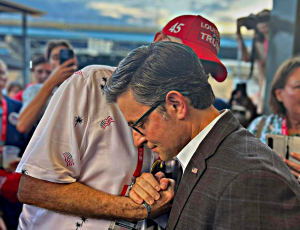
This is the same speaker who aids his state delegation in the annual act of overtaking a bar like a band of Mardi Gras pirates. As a Louisiana politician, he understands the duality of late-night networking and making church on Sunday mornings. He’s quick with hugs and anecdotes, welcoming of selfies and liked among his Democratic and Republican colleagues in Louisiana and Washington for his sharp sense of humor and almost pathological obsession with rules, bylaws and manuals.
Knowing this interview was being recorded, Johnson asked, “Let’s see if a table outside is quieter.”
It wasn’t.
“It’s louder,” the speaker said, still laughing as the sounds of Kid Rock were amplified. “How is that possible?”
At this point, Johnson was holding hands with his wife, Kelly, a former teacher and pastoral counselor, as he made his way around a corner of the House Cloakroom. A staffer followed, as did the speaker’s security detail.
Finally, Johnson found a quiet hallway with small tables for two, complete with ornamental lamps. Over his shoulder a large, muted TV broadcast a live Fox News interview with Donald Trump Jr. The speaker pulled up a chair for his wife, asking her to stay. He blinked in a way that suggested he wished for rest. Kid Rock could barely be heard.
Adjusting his eyeglasses, he began explaining the inspiration behind his convention speech, which was a topic of conversation upon arrival at his temporary office.
Q. Hold that thought for a second or so. We want to ask you about that speech and also want to know if you would be open to a position in a Trump White House. Some delegates are already saying you look and sound like a shortlist contender for attorney general.
A. Speaker Johnson: I want to be of my highest and best use for this moment and this opportunity we have as a nation. I think the role of speaker of the House is so important to the legislative agenda before us. And what we’re doing now is very methodically planning an aggressive agenda for the new Congress, for the first 100 days and beyond. Because we’re anticipating we’ll have a unified government. So as the architect of the playbook, it will be really necessary to implement the plays and have continuity of leadership. Look, I’ll serve my country in any way I’m called, but I feel excited about the opportunities that are ahead of us. I have a very important role to play in that, in the role I have now.
Q. You’ve called for a far-reaching investigation into the shooting of former President Donald Trump. What is your anticipated endgame? Do you want more than findings from the new task force and House Oversight Committee? Recommendations? Other actions?
A. We need accountability. We need to ensure this never, ever happens again. I called for the resignation of [U.S. Secret Service] Director [Kimberly] Cheatle and she shows no signs of taking that course. So I called the White House this morning and said they need to fire her. Joe Biden needs to take decisive action. What we know already is completely inexcusable and dangerous. Accountability begins at the top. I told the White House, his right-hand man, Steve Ricchetti, “This can be an actual moment of leadership for the president, politically. This is low-hanging fruit. Show some initiative, for goodness’ sake. But they won’t, of course.
Q. The party has a vice presidential candidate in Ohio Sen. JD Vance, who at times hasn’t always been a friendly voice for his running mate. Do you get the sense that’s water under the bridge?
A. It is, yeah. I spent time with JD yesterday. We’re becoming fast friends. I have high regard for his intellect, although we have slightly different perspectives about policy issues. But we both agree that’s really healthy for the party. We’re looking forward to leading together. I talked with him for about a half-hour yesterday, just he and I. And we talked about this aggressive agenda for the new Congress and how important it will be for the vice president to be fully engaged in that. We haven’t had a fully engaged vice president in some time. To have him fresh out of the Senate, to know how it works, could be a great benefit to the president.

Q. Your RNC speech about the seven principles of modern conservatism resonated with many delegates. We’ve heard quite a bit of feedback. You created that list years ago, though. What made you bring it back out for that speech, and what originally inspired the list?
A. I was elected to chairman of the Republican Study Committee in 2019. It’s the largest caucus in Congress, the biggest caucus of conservatives. I was just going into my second term, so that was unusual. I mentioned to my colleagues we’re in an unprecedented moment. At the time, in 2019, there was a turbulence in the party and the country — lots of things were being shifted around — and people were losing sight of what it means to be a conservative. What does it mean? As a positive to my colleagues, we had 153 members in the RSC at the time. One day I asked members, “If you were in an elevator downtown today and you had an opportunity with a millennial who had the wrong worldview, what would you say to them to convince them your worldview is preferable? What does it mean to be conservative? If they have a shirt that says, ‘Proud Progressive,’ what do you say?” I think if we created a task force, it would produce a list that looks like this. If you had to condense a library of conservative thought and writing from the founders, from the very beginning, the works that inspired the party platform for the last several decades, and nail it down to one page, what would it be? This is what I think it would be. This is the essence. But really, the core principles of the country itself right now involve speaking with clarity, conviction and consistency more than we ever have. We all need that. I feel more deeply burdened about that today than I did back then.
Q. You mentioned earlier this is the inspiration for a new book. What can you tell us about that? How far are you into the project?
A. It’s almost finished. I was going to try to get it out before the vote, but I don’t think that’s going to happen now. It’s very simple. I’ve been making the case for these seven core principles around the country, Jeremy. I’ve done events in 144 cities in 31 states now. Everywhere I go when I reference this, it resonates deeply. It’s as if people need it. When I’m out and around the country, I have to specify that I’m from Louisiana and I speak in football and hurricane metaphors. Everything to us is one of those. A hurricane metaphor is uncharted waters in choppy seas. There are dark skies on the horizon, right? It’s coming up from the ocean. But the thing is, you have to know where the fixed points are on the horizon. [Late President Ronald] Reagan said in his farewell address, “They called me the Great Communicator. But I really wasn’t. I was just communicating great things. The same great things that have guided our nation since its founding.” That’s the essence of great things. I suggest we’re the stewards of those great things today. We need to know what we believe if we’re going to evangelize and bring people along. People want to know what we’re for, not just what we’re against. That’s going to be central to us moving forward.
Q. What does your travel and fundraising schedule look like this fall in terms of your plans to help incumbents and GOP congressional candidates?
A. It’s endless. I’m trying to be in my district as much as possible. The speaker is also requested to be in every district. So it’s everywhere around the country. It’s a tireless schedule. But we’ve put a slot on the schedule for one, single nap the day after Christmas. I’ll sleep in late December. Between now and then, we’re not stopping.
Q. We’ve got two more questions —
The staffer recording this interview politely made his presence known.
“We have to go. … We have to go, unfortunately,” the staffer said.
Johnson looked up, asking, “What time is Kudlow?”
“Three. Hard. Live. I’m sorry.”
“Live?” the speaker inquired.
“Yes, sir.”
Before standing, Johnson offered to finish our interview by phone. Upon learning the two remaining questions could be condensed into one, he rose to his feet. Someone suggested he could walk and talk.
“Let’s do it,” Johnson said.
The fellowship followed as the speaker slowly made his way to a nearby set of elevators. At what seemed like every corner, he turned to look for his wife, placing his hand in hers or on her back. Despite the convention’s long hours, the sometimes-toxic political environment and the haters who hate everything on social media, there were smiles all around.
Q. A little over two months have passed since a small group of Republican members endeavored to have you removed. As you reflect on that now, where does your mind go?
A. I never skipped a beat. I never looked back. (Where are we going? Who are we following again? This way? Oh. OK!) It’s part of the process. We had the smallest margin in U.S. history. [Former U.S. House Speaker] Newt Gingrich wrote an op-ed for The Washington Times eight weeks ago and said, “Johnson has the most challenging speakership since the Civil War about 160 years ago.” And he made the point that before he became speaker he had 16 years to build a platform and leadership team and structure and fundraising. He said, “Johnson had 15 minutes.” But I had a one-vote margin, you know? That’s behind us. We went through a valley. I kept telling the team to stick together and it’ll be brighter on the other side. I think we’re here now.
Jeremy Alford is managing editor of LaPolitics/State Affairs. Find Jeremy on X or at [email protected].
ABOUT MIKE JOHNSON
- Title: 56th speaker of the U.S. House of Representatives (Republican); represents Louisiana’s 4th Congressional District
- Residence: Bossier Parish
- Age: 52
- Education: Undergraduate degree in business administration from Louisiana State University; juris doctorate from the Paul M. Hebert Law Center at Louisiana State University
- Occupations: Small-business owner, attorney practicing constitutional law
- Hobbies and interests: Johnson has been a conservative talk radio host, columnist, college professor and spokesman for national religious liberty organizations. He has also provided legal counsel for national organizations and community groups and ministries.
- Family: Married to Kelly since 1999. They have five children — Hannah, Abigail, Jack, Will and Michael.

